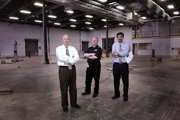April 12, 2010
BIRMINGHAM, Ala. - The U.S. Army Research Laboratory (ARL) has released $1 million for an initial round of federal government-supported research to be conducted in the University of Alabama at Birmingham (UAB) School of Engineering Metals Processing Laboratory, set to come online this August.
The federal funds will support the development and production of innovative materials on scales so large that they essentially are nonexistent in any other university-based, metal-casting lab in the country or industry testing facilities.
The 9,000-square-foot lab at UAB will foster unique research partnerships between UAB faculty and leading industry minds, says Barry Andrews, Ph.D., chair of the UAB Department of Materials Science and Engineering (MSE).
 |
| L-R: Barry Andrews, Alan Druschitz, Uday Vaidya. Download image. |
"The metals lab will allow us to do what very few facilities can do - produce large-scale components and testing in real world conditions - and that is the reason the ARL already has signed on as a research partner and the reason other leaders of industry also are seeking partnerships with UAB," Andrews says.
Under the new ARL project, UAB MSE researchers will use the lab's state-of-art equipment to discover and test new metals and alloys for improved, safer vehicle armor. The equipment is capable of pouring 500-pound test castings, significantly larger than traditional test samples fashioned at similar U.S. facilities.
"The metals lab will provide a low-risk test bed for scaling up processes and allows for rapid transition to industry," says Alan Druschitz, Ph.D., an MSE research professor. "Our facilities will help drive industry innovation while giving our UAB students special opportunities to work on the field's cutting edge."
The ARL metals lab funding is an extension of a multi-year research relationship with UAB MSE that began with grants to its composites lab in 2004 to develop new materials for use in military missile systems and new compounds to create lighter-weight, more reliable body armor for military personnel.
"We were able to establish a strong collaboration with the ARL through our work in the Composite Materials Research Laboratory," says Uday Vaidya, Ph.D., the composite lab's director and an MSE professor. "It is exciting to extend that relationship with new research when the Metals Processing Laboratory comes online."
Once opened, the School of Engineering's new metals lab will join its composites lab under one roof, the 501 Warehouse Building, to form the UAB Material Processing and Applications Development (MPAD) Center of Excellence. The MPAD center will be the only facility of its kind in the country and should help drive materials-science innovation.
"MPAD is a UAB breakthrough that helps meet the crucial innovation needs of the industry and gives our students the chance for numerous professional-level experiences and networking opportunities," Andrews says.
About the UAB School of Engineering
The UAB School of Engineering offers students real-world experience while they train in one of its degree programs. Students experience cutting-edge research opportunities, industry co-ops and unique internships generated by the school's commitment to interdisciplinary learning.